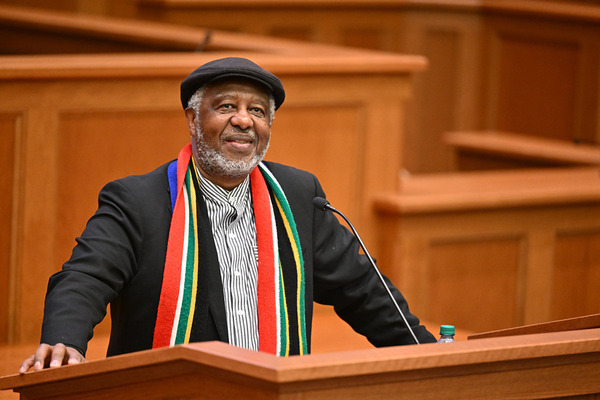Justice Dumisa Ntsebeza of South Africa visits Notre Dame Law School

Justice Dumisa Ntsebeza — a renowned South African lawyer, former acting judge, and current justice of the African Court on Human and Peoples’ Rights — visited Notre Dame Law School as the Distinguished Global Jurist in Residence from January 21 to February 1.
Justice Ntsebeza made significant contributions toward ending the apartheid system and establishing a democratic society in South Africa. He earned his law degree while serving a five-and-a-half-year sentence in prison for political activism. Upon his release in the 1980s, he became a human rights lawyer for apartheid victims and political prisoners.
In 1995, Ntsebeza was appointed by President Nelson Mandela as a commissioner of the South African Truth and Reconciliation Commission. He became the head of the Investigative Unit and also led its Witness Protection Programme. He was the first African to be appointed as senior counsel of the Cape Bar, a society of advocates of the High Court of South Africa. He is currently serving a six-year term on the African Court on Human and Peoples’ Rights.
Ntsebeza gave a talk to the Notre Dame Law School community on January 30 in which he detailed his journey from a young university student working as a messenger for lawyers in Cape Town, to his current position as a justice on one Africa’s highest courts.
Ntsebeza spoke about his time in Cape Town in 1967, working as a messenger for a group of lawyers, known as advocates. At the beginning of that job, the advocate who served as the floor manager examined Ntsebeza’s dompas, a passport-type booklet that all Africans were required to carry. He said Ntsebeza would go by the name Dennis while he worked as a messenger, instead of by his given name of Dumisa.
“That is who I became,” said Ntsebeza.
Weaving together stories about work and the various advocates he worked for, he talked about his job of delivering briefs to and from many attorneys and law firms. He also performed other odd jobs, including making tea for the advocates when they had visitors. During his lunch breaks he would often read the briefs, some authored by the advocates at the firm.
As his legal career progressed, he began having encounters with the advocates who had employed him. He recalled a dinner at the Cape Law Society Council 30 years later, when he sat with a judge who turned out to be the former advocate who had named him Dennis back in 1967. The judge was shocked to learn that Ntsebeza had been the messenger, and asked why he had called himself Dennis.
“I resisted with difficulty having to say you are now able to say Dumisa in 1997. It was 1967 and it was far more convenient to give me a Christian name than to be content with what was not a Christian name, Dumisa,” said Ntsebeza.
Ntsebeza recalled another pivotal moment in 1999, when he was serving on the Cape High Court. He saw a matter differently than the other two senior judges and was going to have to write a dissent. One of the judges, who was yet another advocate Ntsebeza had worked for, changed his mind and wrote a judgment in line with Ntsebeza’s judgment.
“Sitting on that Cape High Court bench, shared with those judges for whom I had been a messenger and a tea maker, life for me had turned full circle,” said Ntsebeza.
During his Notre Dame visit, Ntsebeza also taught a lecture series, “Reconciliation and Justice,” with Christine Venter, director of the Law School’s Legal Writing Program. Ntsebeza and Venter first met while working together as lawyers many years ago in Transkei, an unrecognized state in the southeastern part of South Africa. During the series, Ntsebeza introduced the students to truth and reconciliation processes and their use in post-conflict societies.
“I appreciated all the experiences and opinions he shared with us regarding the transitional justice process in South Africa,” said Monserrat Cámara Santos, a student in the LL.M. Program in International Human Rights Law. “However, one of the most valuable pieces of advice he gave us was the importance of a victim-centered approach in any action. No justice, truth, or reparation will be possible if we do not listen to those who have suffered first.”
This was echoed by other students who had the opportunity to speak with Ntsebeza about his work.
Third-year law student Malcolm Chaka, who also took the course, said, “As a second generation Canadian whose parents immigrated from apartheid South Africa, Justice Ntsebeza’s lecture series was a special honor. His intelligence, bravery, and incessant pursuit for equality helped a nation move past a century of oppression through truth and forgiveness when civil war seemed inevitable.”
Chaka added, “In discussing the role of law in institutionalizing segregation, or the stories of abhorrent atrocities, Justice Ntsebeza provided a valuable lesson on social responsibility owed to not only the oppressed, but to oppressors when a country attempts to amend the wrongs of an authoritative regime.”
Two years ago, Ntsebeza was approached by the South Africa minister of justice to become a judge of the African Court on Human and Peoples’ Rights, even though Ntsebeza was not a sitting judge, he was a lawyer. But the minister said he had reviewed Ntsebeza’s judgments and wanted him to be nominated anyway.
Ntsebeza said he asked himself if he was the right person to be nominated, saying, “Like Nelson Mandela himself said, ‘I am not a saint, unless you think of a saint as one who keeps on trying.’ I tried.”
Watch Justice Ntsebeza’s full lecture from January 30 in the video embedded below.